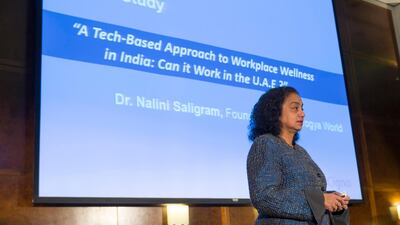Employee happiness is linked to improved workplace productivity, according to numerous studies.
Experimental research from cognitive psychology to affective neuroscience (the study of the neural mechanisms of emotions) repeatedly supports such claims.
An article published in the Harvard Business Review analysed hundreds of studies linking happiness to productivity and after crunching the numbers, the article concluded that happy people were 31 per cent more productive and three times more creative than their unhappy counterparts.
The bottom line? Happiness is good for business.
Efforts to promote employee happiness and wellbeing have blossomed in recent years. They are everywhere.
However, like many initiatives that have their roots in empirical research, the real world implementation can often be a gross degeneration and misreading of the original idea.
For example, forcing employees to wear tee shirts emblazoned with slogans such as “happy to help” or “I love my job” is not promoting employee wellbeing.
Putting up balloons with smiley faces on and calling a basic tearoom a “happiness lounge” is not promoting employee wellbeing.
In some organisations, the happiness and wellbeing agenda descends into a competitive cult of pseudo positivity, where employees feel compelled to smile on pain of dismissal.
Such an environment might be decorated prettily and host lots of fun activities but it is doing little to safeguard or promote employee wellbeing.
A corporate culture where one feels compelled to smile and be positive when one truly feels sad, dissatisfied or anxious is, at best, depleting.
The most notable of these interventions is mindfulness-based stress reduction. At the heart of this programme is the idea that “it’s okay not to feel okay”. The sad face emoji has a place too.
The programme also stresses the idea that all mood states – from happiness to sadness and anxiety – are transitory guests that will leave eventually.
Negative or unpleasant moods are not banished, they just meet a different response.
________________
Read more:
Workers will be demanding more than just a pay cheque
Are budgetary pressures leaving firms short on staff wellbeing?
Being a workaholic can mask problems
________________
The list of corporations offering their employees mindfulness programmes is growing.
Its ranks include giants such as Google, Intel and General Mills. The decision to offer such programmes is often driven by a top-down appreciation of the benefits of mindfulness.
Notable corporate bosses such as Ray Dalio, the billionaire founder of Bridgewater, the world’s largest hedge fund and Jeff Weiner, LinkedIn’s chief executive, are both vocal about their appreciation of mindfulness practices for themselves and their employees.
Once you get beyond the balloons, smiley faces and hype and dig deeper into the happiness agenda, you will find there are elements that can help improve employee wellbeing.
The fact this is also good for business, however, should be secondary. We should aim to improve wellbeing because it is the right thing to do, not simply because it might increase productivity and creativity.
If you have worked in enough different organisations, you will probably know from experience that there is such a thing as a toxic work environment.
You might even have had the displeasure of working for a toxic boss. In such environments, people can become stressed and burnt out; some might even develop physical or mental health problems.
Adding smiley face iconography and a happiness lounge into such an environment will do little to counteract them.
Even introducing a mindfulness programme is questionable. It might help a bit but it is not the solution.
In cases where bad management is the cause of stress, it seems cruel and unusual to then insist that employees take a stress management course.
In his book Dying for a Paycheck, Stanford University professor of organisation behaviour Jeffrey Pfeffer describes this type of practice as "well-washing" – when employers act as if they care for their workers while simultaneously hurting them with bad management practices.
The introduction of a corporate happiness and wellbeing agenda should never be used as an excuse for not dealing with more fundamental workplace problems – for example, bullying, overwork and exploitation.
Without a focus on workplace justice, the “happiness” activities become just another form of corporate well-washing.
Dr Justin Thomas is professor of psychology at Zayed University and author of Psychological Well-Being in the Gulf States
Follow The National's Opinion section on Twitter


